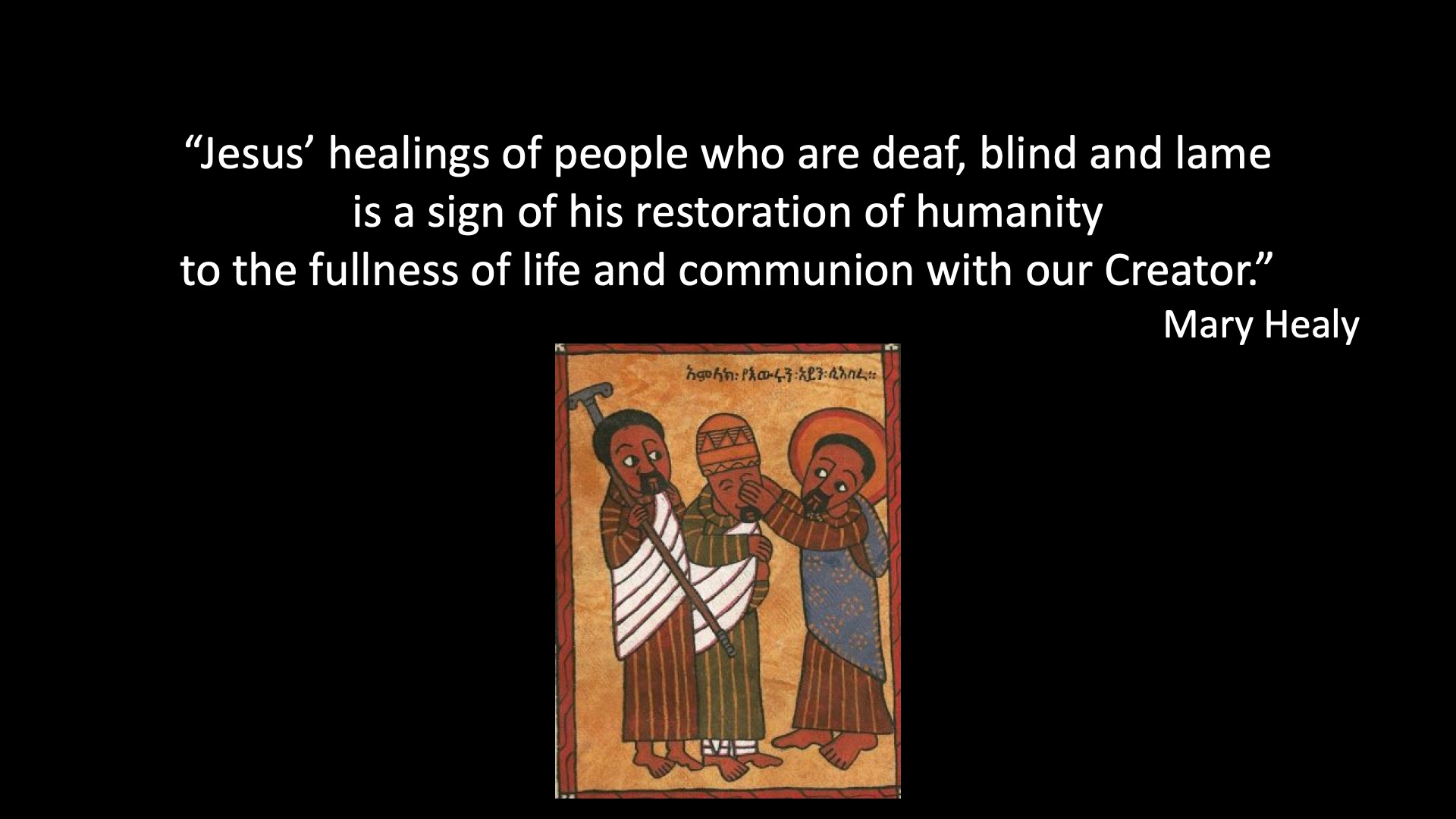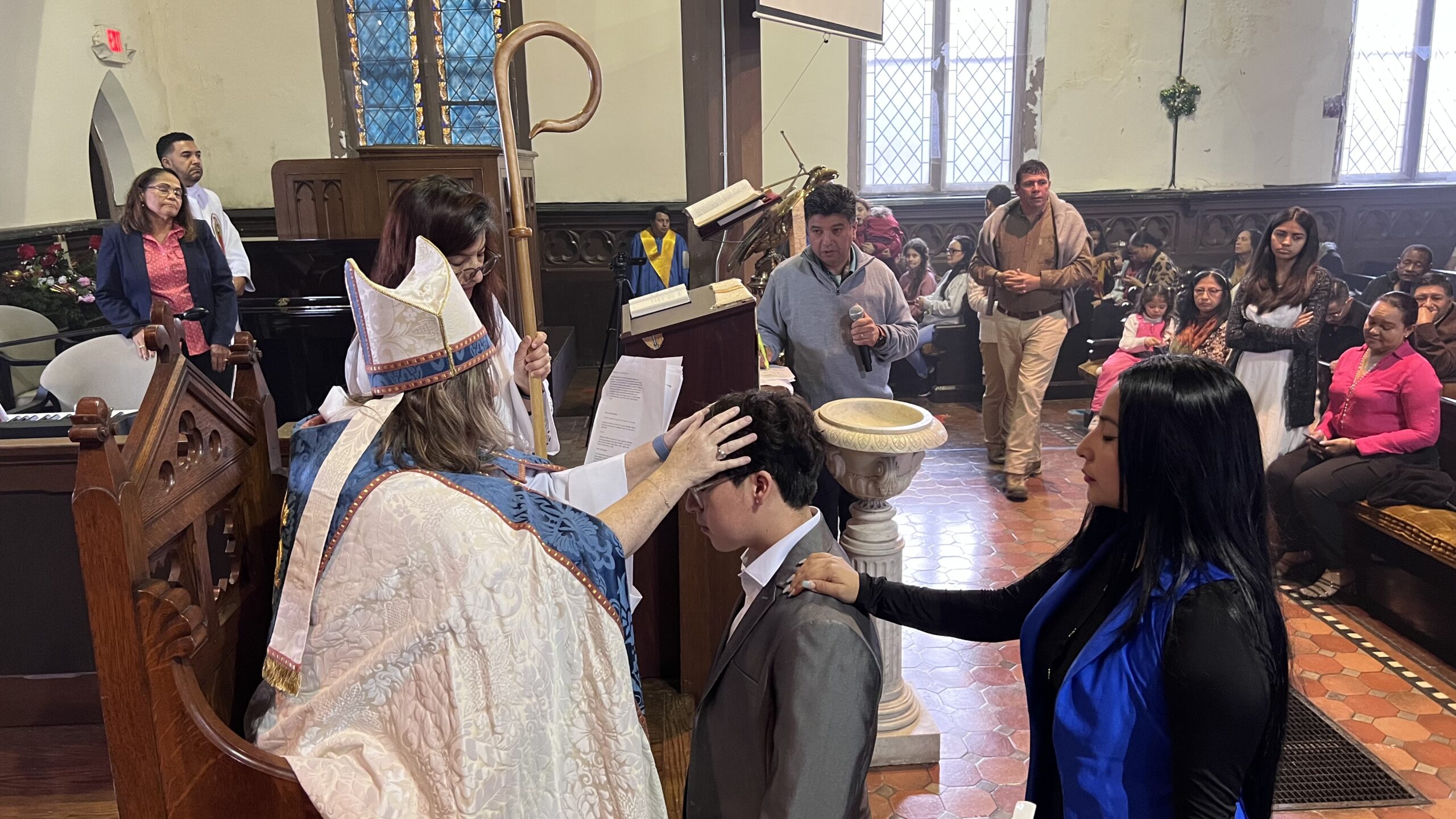The Diocese of New Jersey Online Sermon
15 Pentecost – Proper 18 – Year B – September 5, 2021
James 2:1-10 (11-13) 14 – 17; Mark 7:24 – 37
Preacher: The Right Reverend William H. Stokes, Bishop of New Jersey
“Sir, even the dogs under the table eat the children’s crumbs.” Mark 7:28
In the name of the Father and of the Son and of the Holy Spirit.
Among the many distressing aspects of the COVID19 pandemic and the aggressive nature of the so-called Delta variant, is the inability of young children to get vaccinated. News reports indicate that pediatricians “are being deluged by calls from anxious parents, who are eager to get their children vaccinated against the virus.”[1]
Increasingly, children have been sickened by the disease. A story in The Washington Post notes that “Some parents are seeking ways to get the shots before federal officials give the go-ahead.”[2] The clinical trials have not been completed yet. It’s not clear what dosage might be appropriate for children, or even, if different ages require different dosages. “You don’t want to make assumptions that something safe in a 25-year-old is safe in a 2-year-old,” Rick Malley, an infectious-disease expert at Boston Children’s said. He added, “The FDA’s authorization process needs to play out to assess the risks and benefits, as is done with every vaccine.”[3] But with more than 2,100 children with covid-19 hospitalized[4] and with the disease still raging, parents are desperate.
Their desperation is understandable. Some are going to extremes. Well, that’s what desperate parents do to protect their children. They go to extremes. There is nothing new in this. In fact, that’s what’s going on today’s Gospel reading from Mark, chapter 7 with its account of a Syrophoenician woman; one of two healings related in today’s reading.
This mother is desperate. Her daughter has an unclean spirit (Mk. 7:25). We’re not told more than this, but clearly the daughter is tormented. Because the daughter is tormented, the mother is tormented too. I’ll bet she has tried everything, well almost….
She has heard about Jesus and his powers to cast out unclean spirits, to “exorcise” them. And now, despite his attempts to be inconspicuous, she has discovered he is in her area.
In Mark’s Gospel, Jesus has been covering a lot of territory, teaching, preaching, performing miracles, healing people and casting out demons. He’s fed 5,000 people.[5] Word of that had to get around. He cast out a legion of demons from a man possessed in the land of the Gerasenes.[6] He goes north to Tyre, about 40 miles northwest of the Sea of Galilee, present day Lebanon, to find some solitude. He couldn’t escape notice, even here.
We should be clear, he is in Gentile territory. The woman, the Syrophoenician woman, is a Gentile, a foreigner. She is not numbered among the “children” of Israel. But she is a mother, a desperate mother. Her child is possessed of “an unclean spirit,” – a “demon.” She has confidence – faith – that Jesus can help her and her daughter. She falls at his feet, asks him, begs him, to cast the demon out of her daughter (Mk 7:25 – 26). It is a pathetic scene. It should tear at our hearts. Surely Jesus cannot refuse her desperate plea?
He said to her, “Let the children be fed first, for it is not fair to take the children’s food and throw it to the dogs” (Mk. 7:27).
Wait! What?! What did he just say to her. Did he just call this woman and her daughter “dogs”?
New Testament scholar Matthew Skinner expresses appropriate shock in his reflections on this passage when he asks, “[W]hy the palpable rudeness?” pointing out, “Nowhere else does [Jesus] refuse a direct request to heal someone. Nowhere else does he respond to a suppliant with a bald insult like this, calling her and her afflicted daughter “dogs.”[7] Skinner adds, “Although Jesus’ motives are not clear, the thrust of his refusal is.”[8] Skinner concludes, “This entirely out of character with our usual image of a generously compassionate savior.”[9]
Some try to soften the effect of this apparent rudeness, observing that Jesus did not say to the woman that the “dogs” would not be fed; saying only that the “children of Israel” should come first. Writing for the Working Preacher website, C. Clifton Black writes, “Jesus’ reply to this mother is disturbing. While not ignoring her, he suggests a delay in her petition’s fulfillment based on ethnic priority…and the ignobility of “taking the children’s bread and pitching it to the dogs.”[10] Referring to material in Mark’s Gospel just before today’s reading, the section we heard last week,[11] Black recognizes, “For one who has just spoken of the defilement that emerges from within… it is Jesus who appears ignoble.”[12]
Still, this does not deter this intrepid, quick-witted, Syrophoenician woman, desperate for her daughter’s health and welfare. She is not cowed by Jesus or his response. She answers him, “Sir, even the dogs under the table eat the children’s crumbs” (Mk 7:28).
Black observes, that the Syrophoenician woman “executes some comedic jujitsu, twisting Jesus’ maxim to deliver the retort best suiting her situation.”[13]
I appreciate Roman Catholic Biblical scholar Mary Healy’s observation, “Jesus’ reply expresses his delight with her answer. One can imagine his smile at this lady’s chutzpah. Her indomitable faith has moved his heart to accelerate the plan’… the ‘children’s bread’ is given ahead of schedule to a Gentile.”[14]
I love this story. It’s one of my favorites in the New Testament. It invites rich reflection. To begin with, I think it portrays an “aha” moment for Jesus, a moment when he grew in wisdom and understanding. This makes some people uncomfortable. But consider.
As Episcopalians, it’s our teaching and conviction that Jesus is both “fully human” and “fully divine.”[15] There are times in our reading of the Gospels when the full “divinity” of Jesus is on clear display, as when he casts out the legion of demons from that suffering Gerasene man (Mk. 5:1 ff.), or when he feeds 5,000 (Mk 6:30 ff.), or when he walks on water (Mk 6:45 ff.). So, too, there are times when we catch clear glimpses of Jesus being fully human. Consider his aching cry in the Garden of Gethsemane, “Father, if it is possible, let this cup pass from me” (Mk. 14:36).
Early in Luke’s Gospel, after the 12 year-old boy Jesus has engaged in a precocious conversation with the elders of the Temple in Jerusalem (Lk 2:41 ff.), the writer of Luke’s Gospel makes clear that this boy had to mature in every way, just as everyone of us does. Luke writes of the boy Jesus’ return with his parents, “Then he went down with them and came to Nazareth, and was obedient to them….And Jesus increased in wisdom and in years, and in divine and human favor” (Lk 2:51 -52). Jesus “increased in wisdom,’ in his humanity. Jesus had to grow in his wisdom and understanding. And I believe he is still growing in his wisdom and understanding in this encounter with the Syrophoenician woman.
I wonder if his own words and teaching about what is clean and unclean, about what defiles and does not defile suddenly opened up to new meaning for his own understanding.[16] When he began the conversation, it is clear that his priority is with the Jews. But after this woman confronts his rudeness with a witty, thoughtful and practical retort, Jesus mind is changed. He said to her, “For saying that, you may go—the demon has left your daughter” (Mk 7:29). Mark tells us, “So she went home, found the child lying on the bed, and the demon gone” (Mk 7:30).
It’s the only healing in Mark that occurs at a distance.[17] But it’s not the only healing of a Gentile. It appears that this woman has helped Jesus break new boundaries in his own proclamation and ministry. It’s a critical boundary breaking. As Mary Healy rightly states, “Jesus’ healings of people who are deaf, blind and lame is a sign of his restoration of humanity to the fullness of life and communion with our Creator.”[18]
By extending his mission and ministry to this Syrophoenician woman. And not only her, but also to the man who was deaf in today’s Gospel reading (Mk. 7:31-37), this restoration of humanity to the fullness of life and communion with our creator now includes those beyond the children of Israel. As a sign of this, Jesus will soon feed 4,000 people,[19] who it appears, are also Gentiles, an echo of his feeding of the 5,000 that took place within Jewish territory. This is a clear signal that the Good News of the Gospel is being extended more quickly and more expansively than even Jesus himself imagined.
Thanks be to God for this Syrophoenician woman who caused Jesus to pause and consider what his ministry was about and stirred him to reach even further with the love and light and healing power of his divinity.
May she also draw us to every expanding awareness, insight, wisdom about the power and reach of God’s love, forgiveness and grace as we move about in our world, proclaiming Christ’s message, spreading the good news about Jesus who does all things well. Jesus, who makes even the deaf to hear, and the mute to speak and even such as us to sing his praise.
_________________
Notes
[1] Sellers, Frances Stead and Cha, Ariana Eunjung “Pediatricians besieged by parents seeking coronavirus shots for kids under 12” – The Washington Popst (On-Line) – August 26, 2021 found at Pediatricians besieged by parents seeking coronavirus shots for kids under 12 – The Washington Post
[2] Art.cit.
[3] Ibid.
[4] Ibid.
[5] See Mark 6:30 – 44
[6] See Mark 5:1 – 13
[7] Skinner, Matthew “Commentary on Mark 7:24-37” for Working Preacher – September 9, 2012 found at Commentary on Mark 7:24-37 – Working Preacher from Luther Seminary
[8] Ibid.
[9] Ibid.
[10] Black, C. Clifton “Commentary on Mark 7:24-27” Working Preacher – September 2, 2021 found at Commentary on Mark 7:24-37 – Working Preacher from Luther Seminary
[11] See Mark 7:1-8, 14-15, 21-23
[12] Black – art.cit.
[13] Ibid.
[14] Healy, Mary – Catholic Commentary on Sacred Scripture – The Gospel of Mark (Grand Rapids: Baker Academic, 2008), 145 (Kindle edition).
[15] See “Definition of the Union of the Divine and Human Natures in the Person of Christ” – Historical Documents in The Book of Common Prayer (1979) – New York: The Church Hymnal Corporation, p. 864.
[16] See Mark 7:14 – 23.
[17] Healy, p. 145
[18] Healy, p. 148
[19] See Mark 8:1-10










